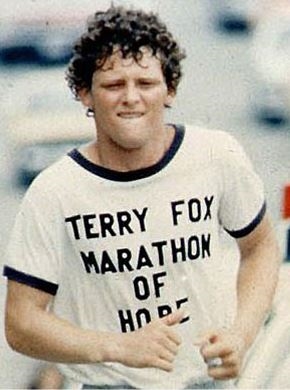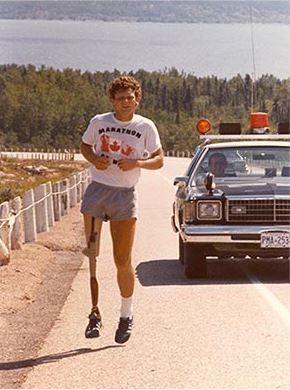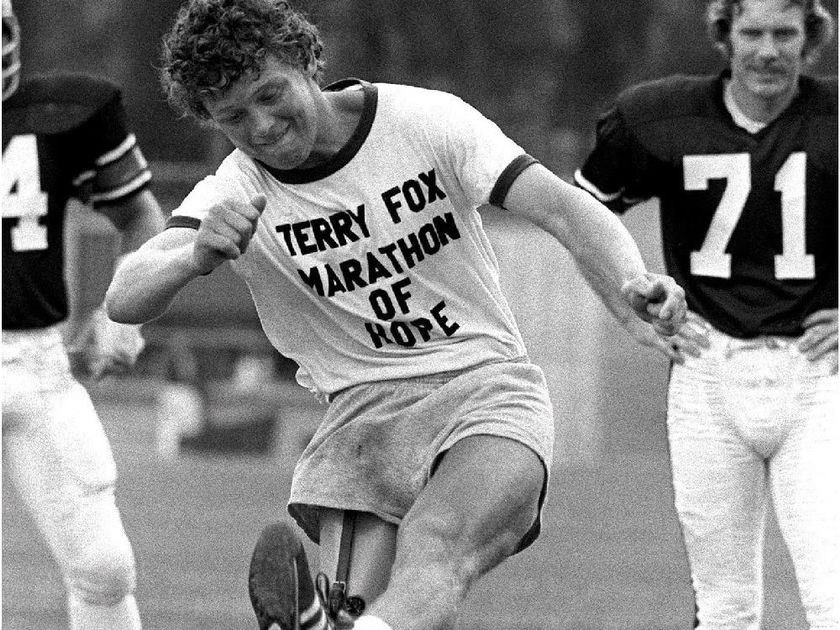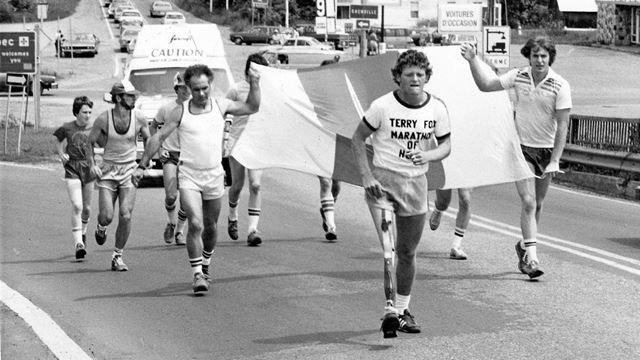“The ancient Greeks said, ‘Tell me who you admire and I’ll tell you who you are’” (Harper). In the essay “How We Choose Our Heroes,” Charles Harper argues that a culture’s heroes define their values, and peoples’ choices in their hero can affect how they act. Too often, we think of heroes as unrealistic people with superhuman powers, flying around in red capes and skin-tight pants. However, heroism does not exclude ordinary people. A hero is someone whom we look up to, whom we aspire to be. Their abilities, no matter how unreachable, should be at least a distant goal that guides our direction of self-improvement. Heroes themselves must be extraordinary, not by what they are given, but how they act with what they already have. No matter how much pressure they are under, heroes must show ambition to surpass ordinary people, but also possess humility, a sign of one’s altruistic spirit and ethical character.
 Terry Fox runs in his "Marathon of Hope" shirt.https://www.terryfox.org/terrys-story/Terry Fox, a one-legged runner, fits this description perfectly. Fox was born July of 1958 in Winnipeg, Manitoba. He was raised in a supportive yet competitive family that loved sports. He played basketball in college, up until age 18, when he was diagnosed with cancer in his leg, that required an immediate amputation above the knee. He is best known for what he did next: Fox set out to run across Canada - a several thousand mile journey, with only one leg. He called this run the “Marathon of Hope,” defying all beliefs of the capabilities of a one-legged person. While he wasn’t able to complete the run, Fox’s movement raised over 700 million dollars for cancer research. He won several awards, including the Order of Canada, the nation’s highest civilian award. Each year, schools and organizations host a run called the “Terry Fox Run” to honor his legacy. A true hero is driven and persistent, especially when presented with an obstacle. They show ambition amidst problems and are able to maintain motivation and resilience even after major setbacks. By fearlessly conquering their challenges, they are able to surpass the ordinary person. When surrounded by fame and popularity, they are still able to maintain humility, focusing only on their actions and contributions, rather than what others think about them. They do not act in order to impress but instead to do good. Terry Fox serves as a hero because of his indomitable ambition and consistent humility, setting an example for others to follow.
Terry Fox runs in his "Marathon of Hope" shirt.https://www.terryfox.org/terrys-story/Terry Fox, a one-legged runner, fits this description perfectly. Fox was born July of 1958 in Winnipeg, Manitoba. He was raised in a supportive yet competitive family that loved sports. He played basketball in college, up until age 18, when he was diagnosed with cancer in his leg, that required an immediate amputation above the knee. He is best known for what he did next: Fox set out to run across Canada - a several thousand mile journey, with only one leg. He called this run the “Marathon of Hope,” defying all beliefs of the capabilities of a one-legged person. While he wasn’t able to complete the run, Fox’s movement raised over 700 million dollars for cancer research. He won several awards, including the Order of Canada, the nation’s highest civilian award. Each year, schools and organizations host a run called the “Terry Fox Run” to honor his legacy. A true hero is driven and persistent, especially when presented with an obstacle. They show ambition amidst problems and are able to maintain motivation and resilience even after major setbacks. By fearlessly conquering their challenges, they are able to surpass the ordinary person. When surrounded by fame and popularity, they are still able to maintain humility, focusing only on their actions and contributions, rather than what others think about them. They do not act in order to impress but instead to do good. Terry Fox serves as a hero because of his indomitable ambition and consistent humility, setting an example for others to follow.
When facing obstacles, Fox did not shy away or become discouraged, but rather was motivated and driven to overcome adversity, showing heroism through his ability to surpass others. In his early years, Fox displayed an abnormal reaction to rejection and disappointment. When his basketball coach told Fox that he was not cut out for basketball, Fox saw an opportunity to improve:
"After three basketball practices, [Coach] McGill suggested that he might be better suited for wrestling...But Terry was determined to stick with [basketball], even if he was the nineteenth player on a team of nineteen. He remembered days when he felt sick with flu or a cold, when he should have stayed in bed, but he forced himself to his feet and ran to school anyway. He worked hard in practice and was rewarded with one minute of floor play all season "(Scrivener 20).
 Terry runs with his prosthetic. He had to take two steps with his left leg so his prosthetic could swing back in place.https://www.terryfox.org/terrys-story/When most people would have followed his coach’s advice, Fox relentlessly worked to make up what he lacked in natural talent for basketball. He saw his failure as a challenge, rather as a burden or finish line. He had the ambition that most people lack; the ability to persevere even when it is easier to quit. It is always easier to do what you are good at; you progress faster while working less. Rather than quitting, his heroic trait of ambition led him to persevere with the sport. Similarly, after his amputation, Fox decided to run across Canada, but preparation for the event was grueling given his physical condition: “‘It was pouring down rain that first day, and the track was covered in mud. My back was sore and my knee was sore, and I really felt, `How am I ever going to run even half a mile, let alone across Canada?'" But he persisted. The next day he ran half a mile, and by the end of the summer he was running 11 miles a day, six days a week” (Terry Fox). A leg amputation typically ends an athlete’s career, and walking with a painful prosthetic is already a challenging task. Just like he was not cut out for basketball, he definitely was not equipped for running. Fox faced his disability directly, challenging himself to run across an entire continent, rather than letting his limitations define him. His amputation served as a driving force, something Fox could overcome. In many ways, his cancer shaped him into a better person. He is admirable because when he was presented with a life-altering loss, Fox diverted his anger and grief into a better cause. In the face of loss and failure, Fox goes above and beyond, displaying heroism through his aspiration.
Terry runs with his prosthetic. He had to take two steps with his left leg so his prosthetic could swing back in place.https://www.terryfox.org/terrys-story/When most people would have followed his coach’s advice, Fox relentlessly worked to make up what he lacked in natural talent for basketball. He saw his failure as a challenge, rather as a burden or finish line. He had the ambition that most people lack; the ability to persevere even when it is easier to quit. It is always easier to do what you are good at; you progress faster while working less. Rather than quitting, his heroic trait of ambition led him to persevere with the sport. Similarly, after his amputation, Fox decided to run across Canada, but preparation for the event was grueling given his physical condition: “‘It was pouring down rain that first day, and the track was covered in mud. My back was sore and my knee was sore, and I really felt, `How am I ever going to run even half a mile, let alone across Canada?'" But he persisted. The next day he ran half a mile, and by the end of the summer he was running 11 miles a day, six days a week” (Terry Fox). A leg amputation typically ends an athlete’s career, and walking with a painful prosthetic is already a challenging task. Just like he was not cut out for basketball, he definitely was not equipped for running. Fox faced his disability directly, challenging himself to run across an entire continent, rather than letting his limitations define him. His amputation served as a driving force, something Fox could overcome. In many ways, his cancer shaped him into a better person. He is admirable because when he was presented with a life-altering loss, Fox diverted his anger and grief into a better cause. In the face of loss and failure, Fox goes above and beyond, displaying heroism through his aspiration.
 Terry makes the opening kick-off at an Ottawa football game. ottowacitizen.comFox also acted like a true hero by expressing humility, finding value in self-improvement and contributions to society, rather than fame and wealth. On top of his lack of basketball talent, he was ridiculed by his peers for working harder than they were: “He thought his teammates laughed at him for that, but he didn’t let it get him down. That summer he called Doug and said, ‘Do you want to play a little one-on-one?’ Doug, at the other end of the line, paused, remembering that Terry was a pretty fair runner, but a lousy basketball player, and said no. But Terry persisted” (Scrivener 21). As a middle schooler, Fox was already immune to the onslaught of childhood teasing that forces others into a box of conformity. Even when he knew he was no match for Doug, Terry was determined to compete with him. Fox’s self-confidence and insensitivity to embarrassment helped develop his humility; by ignoring and disregarding criticism and embarrassment, he proved his lack of pride and arrogance. Most people do not go into a game expecting to lose, yet Terry’s motives are not to win, but to improve. By playing with more advanced people, his dignity may be bruised, but his skill level would advance. He is not bothered by standing out as a failure or hurt by what others think of him, and like an admirable hero, he puts his personal pride behind his long-term goals. This pattern of modesty continues not only throughout his childhood, but also his adult life. When his cancer spread to his lungs and his marathon had ended, Terry was determined to put his personal gain aside by encouraging someone else to complete his project: “Terry told several thousand people that his fame was not meant to be of the Run, he wasn’t interested in wealth or notoriety, and that he was just a guy running across the country to collect money for cancer research. He also said that the Marathon had to continue even without him” (Terry Fox Foundation). Fox refers to himself as “just a guy,” with no distinguishing features from anyone else. He neglects to mention the leg he lost to cancer in his teenage years. He went from being a college basketball player to a legally disabled amputee in less than a week, yet he did not let his loss limit him, seeing himself as no better than the average runner. Instead, he felt that how he had helped was more important, emphasizing “the Run,” and not himself. Handing his project off to someone else, Fox establishes his apathy towards self-image and personal gain. By stressing the greater good over his fame and ego, Fox was able to develop his humility and prove his heroism.
Terry makes the opening kick-off at an Ottawa football game. ottowacitizen.comFox also acted like a true hero by expressing humility, finding value in self-improvement and contributions to society, rather than fame and wealth. On top of his lack of basketball talent, he was ridiculed by his peers for working harder than they were: “He thought his teammates laughed at him for that, but he didn’t let it get him down. That summer he called Doug and said, ‘Do you want to play a little one-on-one?’ Doug, at the other end of the line, paused, remembering that Terry was a pretty fair runner, but a lousy basketball player, and said no. But Terry persisted” (Scrivener 21). As a middle schooler, Fox was already immune to the onslaught of childhood teasing that forces others into a box of conformity. Even when he knew he was no match for Doug, Terry was determined to compete with him. Fox’s self-confidence and insensitivity to embarrassment helped develop his humility; by ignoring and disregarding criticism and embarrassment, he proved his lack of pride and arrogance. Most people do not go into a game expecting to lose, yet Terry’s motives are not to win, but to improve. By playing with more advanced people, his dignity may be bruised, but his skill level would advance. He is not bothered by standing out as a failure or hurt by what others think of him, and like an admirable hero, he puts his personal pride behind his long-term goals. This pattern of modesty continues not only throughout his childhood, but also his adult life. When his cancer spread to his lungs and his marathon had ended, Terry was determined to put his personal gain aside by encouraging someone else to complete his project: “Terry told several thousand people that his fame was not meant to be of the Run, he wasn’t interested in wealth or notoriety, and that he was just a guy running across the country to collect money for cancer research. He also said that the Marathon had to continue even without him” (Terry Fox Foundation). Fox refers to himself as “just a guy,” with no distinguishing features from anyone else. He neglects to mention the leg he lost to cancer in his teenage years. He went from being a college basketball player to a legally disabled amputee in less than a week, yet he did not let his loss limit him, seeing himself as no better than the average runner. Instead, he felt that how he had helped was more important, emphasizing “the Run,” and not himself. Handing his project off to someone else, Fox establishes his apathy towards self-image and personal gain. By stressing the greater good over his fame and ego, Fox was able to develop his humility and prove his heroism.
 Followed by his van, Terry runs among supporters cheering him on.irun.caThrough his relentless ambition to face obstacles and his modest, focused personality, Terry Fox has earned the title of a true hero. He was always humble and refused to consider himself a hero. Even as a child, he was able to block out judgment from his peers. He never valued his glory over the progress toward cancer research, especially during his Marathon of Hope. Terry Fox achieved something that most of us simply cannot - he pushed his physical and mental strength to an unbearable limit. He devoted every last bit of his life to a greater cause, literally running a marathon a day until the end of his life. However, his motives and values serve as an everyday example to all. Every September, I would listen to Fox’s tragic story in admiration as my school hosted a Terry Fox Run. All the classes would line up behind the school and jog around the trail for hours, helping continue Fox’s legacy. When I moved from Canada to the United States, I was put in an uncomfortable position with little support or consolation outside of my family. I did not know how to fit in or what to do first, but my struggle helped me relate to Terry Fox. While having to live in San Diego does not come close to what Fox had to go through, his story served as an inspiration to me more than ever. Canada is my birthplace and childhood home, and much like Fox’s leg, it was a part of me that I lost. Yet in the face of this loss, I felt determined to not only fit in, but to thrive in my new environment. After what Fox went through, I felt obligated to do my best. It is in moments like these where Terry Fox’s spirit brings out the best in us. Fox once said, "I believe in miracles. I have to” (Blatchford). Fox proved that it is entirely possible to survive a disaster, that you do not have to succumb to your setbacks. He inspires others to persevere with a challenge, no matter how difficult or hopeless the situation, even if it would result in failure. He embodies an ideal character, one that is modest but driven, content but striving for improvement. Through his heroism, Terry Fox truly represents Canada’s national spirit.
Followed by his van, Terry runs among supporters cheering him on.irun.caThrough his relentless ambition to face obstacles and his modest, focused personality, Terry Fox has earned the title of a true hero. He was always humble and refused to consider himself a hero. Even as a child, he was able to block out judgment from his peers. He never valued his glory over the progress toward cancer research, especially during his Marathon of Hope. Terry Fox achieved something that most of us simply cannot - he pushed his physical and mental strength to an unbearable limit. He devoted every last bit of his life to a greater cause, literally running a marathon a day until the end of his life. However, his motives and values serve as an everyday example to all. Every September, I would listen to Fox’s tragic story in admiration as my school hosted a Terry Fox Run. All the classes would line up behind the school and jog around the trail for hours, helping continue Fox’s legacy. When I moved from Canada to the United States, I was put in an uncomfortable position with little support or consolation outside of my family. I did not know how to fit in or what to do first, but my struggle helped me relate to Terry Fox. While having to live in San Diego does not come close to what Fox had to go through, his story served as an inspiration to me more than ever. Canada is my birthplace and childhood home, and much like Fox’s leg, it was a part of me that I lost. Yet in the face of this loss, I felt determined to not only fit in, but to thrive in my new environment. After what Fox went through, I felt obligated to do my best. It is in moments like these where Terry Fox’s spirit brings out the best in us. Fox once said, "I believe in miracles. I have to” (Blatchford). Fox proved that it is entirely possible to survive a disaster, that you do not have to succumb to your setbacks. He inspires others to persevere with a challenge, no matter how difficult or hopeless the situation, even if it would result in failure. He embodies an ideal character, one that is modest but driven, content but striving for improvement. Through his heroism, Terry Fox truly represents Canada’s national spirit.
Works Consulted
"Terry Fox." Contemporary Heroes and Heroines, vol. 1, Gale, 1990. Biography in Context,
https://link.galegroup.com/apps/doc/K1607000096/BIC1?u=powa9245&xid=2023ef3f.
Accessed 27 Dec. 2017.
Scrivener, Leslie. Terry Fox: His Story. McClelland & Stewart, 2000. Kindle Edition.
Fox, Terrance. “Journal and Map.” The Terry Fox Foundation,
www.terryfox.org/terrys-story/journal-map/. Accessed 27 Dec. 2017.
Blatchford, Christie. "At these Games, the presence of Terry Fox, courageous and inspiring, felt
by all." Globe & Mail [Toronto, Canada], 13 Feb. 2010, p. A8. Biography in Context,
https://link.galegroup.com/apps/doc/A218860288/BIC1?u=powa9245&xid=3d7f1ba1.
Accessed 21 Dec. 2017.
Page created on 2/25/2018 11:49:39 PM
Last edited 2/27/2018 7:33:56 PM
